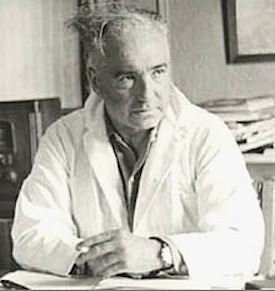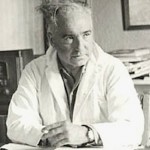In searching for this week’s piece on sex and relationships, I came across a blog post by Betty Dodson, Planet Waves’ honorary godmother of orgasms, in which she features a Kickstarter drive started by a man named Kevin Hinchey. Hinchey is working on a documentary of Wilhelm Reich’s life.

Wilhelm Reich
Betty writes, “I have always referred to Wilhelm Reich as my Hero. Much of what I’ve read about Reich, I’ve incorporated into my practice with close to 100% success rate teaching women how to enjoy their orgasms. His book The Function of Orgasm sits on my bookshelf.”
Eric, too, has often cited Reich’s research as an essential counterpoint to the work of Freud, who got caught up in his “death drive” idea (Thanatos). Eric has written that, “[Reich] believed that Freud and his cadre were afraid to deal with sexuality honestly, and he was correct about this. Reich left the fold and focused his subsequent work on developing therapies that helped people let go of what he called personality armor, and develop their capacity for pleasure.” (From Part 6 of It’s Not About Sex. It’s About Self.)
In the video above, Hinchey outlines Reich’s life, and the importance of finally bringing to film a full accounting of his controversial (and misunderstood) research, and subsequent persecution by several Federal agencies. The Kickstarter campaign has about two weeks left to meet its goal. Below is Hinchey’s summary from that page — though to get the full flavor of Reich’s life and why his story is so compelling, watch the video:
Austrian-born Wilhelm Reich, M.D., (1897-1957) was a brilliant psychoanalytic student of Sigmund Freud and a neuro-psychiatric student of Nobel laureate Julius Wagner-Jauregg.
Reich’s wide-ranging social, medical and scientific work included promoting sexual health, standardizing and advancing therapeutic techniques, analyzing the psychology of fascism as manifested in both Nazism and Communism, conducting cellular research, investigating the origin of cancer and other diseases, developing experimental treatments for terminal cancer patients, and carrying out innovative climate research.
Tragically his books and published research journals were banned and burned by the United States government in 1956 and 1960, and Reich died in a Federal penitentiary in 1957.
How could such a thing have happened in America, the country to which Reich — an outspoken antifascist — had emigrated just four days before the outbreak of World War II? What was in Reich’s publications that so threatened people in power that they felt they must destroy them to keep people from reading them?
For decades Reich’s ideas and work have been carelessly and dishonestly misrepresented in the academic, medical and scientific communities, as well as in the media and on the Internet — including Wikipedia — by those whose knowledge of Reich is not based on accurate information.
Finally, a factually accurate, full-length documentary film about Reich has been meticulously researched and written, and a serious effort is now underway to fund this film. This documentary will not only correct the distorted narratives about Reich, but will also educate viewers about the potential benefits of Reich’s work for today’s medicine and science.
I, for one, would like to see this project make it to the big screen. And in the realm of filmmaking, the fundraising goal for such an ambitious project is fairly modest. Hinchey’s Kickstarter page details all that must be done to complete the film, which is fully written and researched.
A little more about Reich:
— Revolutionizes psychoanalytic techniques (1920s).
— Opens clinics which provide access to birth control (1920s-30s).
— Publishes The Mass Psychology of Fascism after fleeing from Nazi Germany (1933).
— Develops the first psychosomatic therapeutic techniques (1930s-40s).
— Conducts laboratory research on the development of cancer cells (1930s-50s).
— Discovers a biological radiation in specific micro-organisms that can kill bacteria and cancer cells (1939).
— Discovers this same radiation in the atmosphere (1940).
— Conducts experimental treatment of patients with terminal cancer, early cancer and other diseases (1941-50s).
— Fights the investigative abuses of the State Department, the FBI, the FDA, and the Immigration & Naturalization Service (1940-57).
— Struggles against the collusion of the FDA and the medical profession (1947-50s).
— Warns of pharmaceutical influence on the medical profession (1950s).
— Conducts weather experiments in Maine and Arizona to alleviate drought conditions (1953-56).
— Confronts censorship and First Amendment issues when a Federal court seeks to ban his publications from interstate commerce (1954).
— Challenges the right of a court of law to judge scientific research (1954).
— Witnesses the FDA’s burning of his publications at his laboratory in Rangeley, Maine (1956).


Done. I love the work of Reich and would love to see this documentary done. Also passed on to my friend who is a reich therapist.
Heloisa — thank you! I agree — this film sounds fascinating, and Reich’s story deserves to be told to a wide audience, in a compelling way.
I researched a few Reich quotes the other day that I didn’t use in a Thursday article. Here they are:
“The fact that political ideologies are tangible realities is not a proof of their vitally necessary character. The bubonic plague was an extraordinarily powerful social reality, but no one would have regarded it as vitally necessary. ”
— The Mass Psychology of Fascism
Psychic disturbances are the consequences of the sexual chaos of society. For thousands of years, this chaos has had the function of psychically subjecting man to the prevailing conditions of existence, of internalizing the external mechanization of life. It has served to bring about the psychic anchoring of a mechanized and authoritarian civilization by making man incapable of functioning independently.
— The Function of the Orgasm
The character structure of modern man, who reproduces a six-thousand-year-old patriarchal authoritarian culture is typified by characterological armoring against his inner nature and against the social misery which surrounds him. This characterolgical armoring of the character is the basis of isolation, indigence, craving for authority, fear of responsibility, mystic longing, sexual misery, and neurotically impotent rebelliousness.
— The Function of the Orgasm
Don’t try to improve on nature. Learn to understand it and protect it. Go to the library instead of the prize fight, go to foreign countries rather than to Coney Island. And first and foremost, think straight, trust the quiet inner voice inside you that tells you what to do. You hold your life in your hands, don’t entrust it to anyone else, least of all to your chosen leaders.
— Listen, Little Man!
“I know that what you call ‘God’ really exists, but not in the form you think; God is primal cosmic energy, the love in your body, your integrity, and your perception of the nature in you and outside of you.”
— Listen, Little Man
Every one of your acts of smallness and meanness throws light on the boundless wretchedness of the human animal. ‘Why so tragic?’ you ask. ‘Do you feel responsible for all evil?’ With remarks like that you condemn yourself. If, little man among millions, you were to shoulder the barest fraction of your responsibility, the world would be a very different place. Your great friends wouldn’t perish, struck down by your smallness.”
— Listen, Little Man
“We live in a community of people not so that we can suppress and dominate eachother or make each other miserable but so that we can better and more reliably satisfy all life’s healthy needs.”
— Children of the Future
“You have no sense of your true duty, which is to be a man and preserve humanity. You imitate wise men so badly and bandits so well. Your movies and radio programs are full of murder.”
— Listen, Little Man
“Man’s right to know, to learn, to inquire, to make bona fide errors, to investigate human emotions must, by all means, be safe, if the word “freedom” should ever be more than an empty political slogan.”
— Selected Writings
I have forwarded this to some friends here in New York… I think they’ll be interested.
very cool, sojourn — thank you!
What were they so scared of?